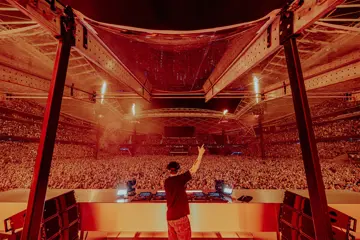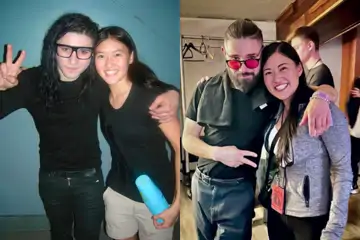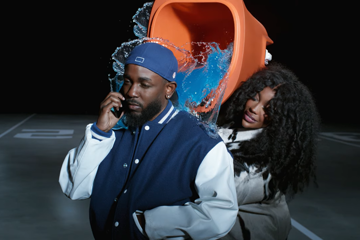Edward Nygma, aka Gotham City's puzzle-prone supervillain The Riddler, has always had the potential to be one of Batman’s most intriguing, multi-layered foes, though it took comic books several decades to elevate the man from a one-note gimmick to a complex, three-dimensional character.
It was a transition of the most glacial pace, not exactly aided by largely goofy on-screen portrayals in the mid and late 20th century, with two prior live-action TV iterations (Frank Gorshin and his successor, John Astin) and a feature-film appearance by Jim Carrey cementing The Riddler's status as little more than a hyperactive nuisance with a Lycra fetish and an inexplicable need to tell his opponent — albeit cryptically — exactly what nefarious plans he had up his sleeve.
But, even with early animated appearances in the 1960s-80s reinforcing the campy, unitard-clad interpretation of the character, change eventually took hold: the 1990s' Batman: The Animated Series gave Nygma a new look — actually first worn by Gorshin in 1966's Batman: The Movie, and since adopted as his primary outfit in the comics — as a suit-and-bowler-hat-wearing genius initially out for vengeance against an employer who had scorned him, consequently driven forward by his obsessive desire to outsmart his nemesis and anyone else who would oppose him. (Granted, the series' successor, The New Batman Adventures, reverted to the unitard, and mid-2000s series The Batman went full weirdo-goth — but the less said about that, the better.)
Along with that reinterpretation and a few consequent re-imaginings in the comic books, his mythos has found further substance elsewhere: he was a persistent presence throughout the Arkham games of the past decade, and — although not canon — writer/artist Alex Ross even suggested in his 2005-2007 series Justice that Nygma's penchant for riddles was the result of an abusive father who used to beat the truth out of his son when he suspected the latter was lying, the villain's clues a manifestation of his ensuing psychological inability to be untruthful about his intentions.
All of which is to say: The Riddler has come a long, long way since his first appearance almost 70 years ago.
Don't miss a beat with our FREE daily newsletter
In the case of popular Fox TV show Gotham, a similar degree of depth has been achieved for the character, though it's done so in a much shorter time frame, across its three seasons to date, gradually coaxing Nygma's inner evil out from underneath a shell of naivety and social awkwardness. Even so, for actor Cory Michael Smith — presently in Australia ahead of his impending appearance at Supanova Comic-Con & Gaming Expo — reaching the point where he has finally stepped into the shoes of one of Batman's greatest supervillains still felt like an eternity.
"I actually said to the producers ... ‘When does this change? When does my life change? When do things start happening?'"
"It started so slow for me; season one really tested my patience," he laughs. "I was just some dopey, gawky, chipper dude walking around the GCPD, trying to make some friends and make people laugh and test people, and I just kept pissing people off and upsetting them, but it was this long period for him — it felt very much like his life.
“I kept coming in and kept making effort to impress these people, as Edward, and make people laugh, and was just getting shutdown after shutdown, and I actually said to the producers ... ‘When does this change? When does my life change? When do things start happening?’ and they were like, ‘Yeah; yeah, that’s Edward’s experience, isn’t it?’ But, once the ball started rolling, I started having a blast, and I’m having more fun than ever. And, now that we’ve finished season three, I can officially call myself The Riddler, and that feels pretty darn fantastic."
Describing Nygma's shift from maligned and misunderstood coworker, to accidental murderer, to aspiring criminal mastermind as "one of the most extreme and cared-for evolutions on the show", Smith says that his character's journey represents "a very smart transition" for Gotham over the course of its existing arc, one that has served both show and character in very good stead by establishing Nygma's underlying humanity before tearing him down and rebirthing him as The Riddler, ensuring a genuine connection was established with the series' viewers.
"I certainly try to connect everything to a piece of humanity, and not just be evil for evil’s sake; that’s not that interesting."
"I think the audience got to sit with Edward as a genuinely well-intentioned young man, and to see him kind of suffer, and then the unfortunate events that befell him," he muses, reflecting on Nygma's journey. "At a certain point, when you’re in your late 20s and you just can’t catch a break, and when you finally do have the first taste of normalcy in your life ever — that being a relationship with a beautiful woman who loves you back — and you’ve lost your virginity and you’re going on dates, and all of a sudden this guy at your work, Gordon [Ben McKenzie], likes you, and is on a double-date with you, and that’s taken away from you by you accidentally killing your second person... at a certain point, it’s like, you know, this guy looks at his life and he goes, ‘You know, I’m not making these decisions; this is the world taking over my life. This is fate.’
"I’ve always found that to be a really interesting way to kick Edward into villainy, by him forfeiting his attempts at being a good guy, at being kind, and trying to make friends with people, just trying to love someone. It’s like, the world’s just not going to let him do it, and he can’t do it any more. He has to kind of forfeit that, and accept the role that he thinks the world has given him. And I think there’s a tragedy to that, that a viewer, as they watch that, can have some sort of compassion and sympathy for him, so that as he goes forward, it’s almost… you feel so bad and sad when you see this person doing all this stuff. So, I don’t know, maybe that’s what people are attached to. I certainly try to connect everything to a piece of humanity, and not just be evil for evil’s sake; that’s not that interesting."
While Nygma's slide into villainy appears, at face value, to be something of an inevitability — it was a foregone conclusion at the outset that we'd eventually see the man take on the persona of The Riddler, though there was no telling when that change would take place — Smith says that he enjoys the idea "that there is a way that he could not have been this evil, evil person".
"I like to think that there’s a way that most people who cause harm and destruction wouldn’t be that way, for whatever reason, whether it’s ideological, or abuse or neglect, or mental illness," he reflects. "I think his turn into villainy is an amalgamation of a few of those things, so, yeah, I think he’s more interesting if he’s someone who possibly could have had a life where he wasn’t harming people or choosing to wreak havoc. Perhaps still contentious, and liked challenging other people, but I like that there was another life and another path for him that was a bit brighter."
It's nice to think about whatever alternative universe exists in which Nygma ultimately got his happiest ending, but in Gotham's reality, it was not to be — especially not once the character started rubbing shoulders with the city's ascendant crime lord, Oswald "The Penguin" Cobblepot (Robin Lord Taylor). Since their very first scene together back in season one, the pairing of Nygma and Cobblepot has been one of the series' most compelling relationships, and it has only grown in both complexity and entertainment value — through the duo's blossoming camaraderie, underlying antagonism and genuine love alike — as the show has progressed.
"Oswald is really one of the only people who can sometimes outsmart Edward, for now, because he’s understanding what Edward’s intentions are, what his habits are, what his neuroses are."
Echoing Taylor's sentiments about the innate chemistry that exists between both actors and their characters, Smith says that their fruitful onscreen compatibility is the product of several factors.
"Well, I think they work together for a couple of reasons: one, because Robin and I are dear friends now, and we get along very well, and that dynamic transfers very well to the screen," he explains. "Even when we are at odds with each other, Robin and I are very… it feels very safe, working with each other, and we’re able to do things with each other and mess with each other and be quite competitive on screen with each other, trying to get the upper hand, and when we finish … we just, like, hang out. It’s just easy. It’s a really great environment.
"But I also think that Edward admires Oswald so much, and Edward is able to use his skills and intelligence and ability to… he kind of understands Oswald better than Oswald sometimes, and knows what he wants and what motivates him, and he’s able to guide Oswald to getting what he wants, and vice-versa. Despite Edward not wanting to hear it, Oswald knows him just as well, and it creates this really interesting dynamic where Oswald is really one of the only people who can sometimes outsmart Edward, for now, because he’s understanding what Edward’s intentions are, what his habits are, what his neuroses are, because he’s spent so much time with him, and so he’s able to predict some things that Edward is going to do, which is dangerous for Edward, because he thinks he can outsmart everybody.
"It’s just a really interesting relationship; I think it’s one of the richest relationships on the show, because they’ve allowed us to have so much history together and so many shared events. It’s been really, really fun; it’s been really fun to spend so much time with him at work."
The on-set fun of Gotham also translates to the finished onscreen product of the show itself. In fact, it's pretty broadly accepted by fans of the show that, in its second season, Gotham underwent a fundamental shift in tone that saw it distance itself somewhat from its straighter crime-procedural origins to more fully embrace its comic-book roots and get a little looser, a little more ambitious, a little more exciting in what it was bringing to the table in terms of charting the rise of several of Gotham City's best-known and best-loved villains. According to Smith, it was a transformation that was "absolutely" felt among the cast and crew as the show reimagined itself anew following its (still generally successful) maiden season.
"We were all very, very aware of the transition of style and format at work, and we were all very excited as each episode kind of came out," he says of the series' structural changes. "We always get together as a cast with our producers and the writer and director, and read each episode together. It’s just a nice little family bonding time for us, because, you know, we don’t all get to work together. So we get to reconnect and read each episode together. As we were reading them, it just… each one just felt like, ‘Yes! Yes! This is heading in the right direction.’ We have rerouted ourselves, and it felt way more exciting. It felt right. So we all were very aware of it, we were cheering on the writers and the showrunner, and were really celebrating the redirection of the show."
"It’s pretty exciting to now have this moment where he is donning the name and donning the hat and is wearing the green suit, but that doesn’t mean anything if he doesn’t know what his objective is."
Although the Gotham crew have finished filming season three, the final eight episodes are yet to air, and Nygma’s ultimate acceptance of his destiny as one of the city's foremost supervillains will only be seen when the show returns this week in the US, with an episode titled — fittingly enough — How The Riddler Got His Name. For his part, Smith is positively jubilant about the prospects of what that means for the character after so long a journey.
“I finally get to call myself The Riddler on-screen for the first time,” he enthuses. “And I feel like it’s just a very cool thing, because up until that point, it’s like, I wasn’t really The Riddler, so I wasn’t really the third live-action Riddler; I was the third live-action Edward Nygma on my way to becoming The Riddler. But now, as it stands, I am truly the third live-action Riddler, and that’s just a pretty cool thing.
"But, in terms of the narrative, it’s pretty exciting to now have this moment where he is donning the name and donning the hat and is wearing the green suit, but that doesn’t mean anything if he doesn’t know what his objective is, or what he wants from this, or how best to be this person, and so there’s still so much — and really this is going to go well into season four — how does he become the best version of that? So, at the start, I had him kind of experimenting with how to deliver a riddle, how to interact with an audience that is captive, how to present yourself, and initially I have him doing things that are a bit brusque and tight and forced — he’s trying to figure it out — but I want him to kind of move to a very different version of The Riddler; his expressions are perhaps a bit more elegant and with grace."
"It would be very interesting to see how The Joker would handle puzzles and problems set up by The Riddler where he is in danger, and the only way to solve them is to be analytical."
It’s not just his own character about which Smith is excited, but Gotham’s direction in general. With The Riddler set to make a proper return to the comic books in the near future — facing off against the Dark Knight's arch-nemesis, The Joker, in a kind of supervillainous civil war, with Batman's rogues gallery taking sides in a skirmish sure to be one for the ages — Smith says that he would be keen to see his Nygma go toe-to-toe with the series' own take on The Joker, a young madman by the name of Jerome (Cameron Monaghan), because, despite their similar names, their modi operandi couldn't be more diametrically opposed.
"I think that it’s an interesting pairing-off, and I think I’ve said this at a comic con recently; somebody had asked me who I wanted to work with on the show, and I said Jerome, you know, our pre-version of the Joker," he elaborates. "I think it’s an interesting pairing, because The Joker is really about anarchy and destruction for destruction’s sake, and when you have someone that likes questions and answers and analysis and puzzles — things that have to be solved, not crushed — I think it’s very interesting. It would be very interesting to see how The Joker would handle puzzles and problems set up by The Riddler where he is in danger, and the only way to solve them is to be analytical. I think that’s a pretty exciting dilemma for The Joker character."
Hypotheticals aside, Smith teases that Gotham is set to delve even deeper into the comics’ mythological well as the show stares down the barrel of season four, with surprises and delights in store for long-time fans of Batman and his crime-riddled city, and new devotees alike.
"Our team of producers, they’ve kind of taken on a new way of going about this, now, and it starts, really, with… towards the end of season three, they decided to go less obvious with most of their choices," he allows. "We're going to see some transitions happening at the end of season three, and some identities unveiled that I think are going to be really surprising, and people aren’t deep into the mythology probably won’t — may not — recognise. But, like, the people that love Batman and the mythology are really gonna get excited by some of this stuff that we’re doing. So I’m excited to see who else in season four they’re going to pull out from the deeper end of the well in terms of the villains.
"There are some very, very cool ones. I think that they make a few choices towards the end — and Ra's al Ghul is coming in at the end of the season, which isn’t as, like, obscure by any means — but there are a couple of revelations at the very end that are so good. So good!"
Gotham returns to TV in the US on 24 April.
Cory Michael Smith is appearing at Supanova Comic-Con & Gaming Expo at the Gold Coast this weekend, 22-23 April.















